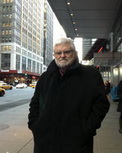 Chris
McDonnell, UK
Chris
McDonnell, UKchristymac733@gmail.com
 Chris
McDonnell, UK
Chris
McDonnell, UK
christymac733@gmail.com
Previous articles by Chris Comments welcome here
March
22
Thanks for stopping

Our
culture is quick to criticise, to look for someone or some institution to
blame. Our Church has not escaped such circumstances, for in recent years,
many things have gone wrong. Nothing new in that, just that in earlier
times we didn't have our faults blown across the media in front page
headlines or shared world-wide on the net. Now every fragility is exposed
and condemnation comes before honest evaluation of the facts.
Those
of us who claim membership of the Church are no less responsible for, when
something happens that we don't like, we blame 'the Church' rather
than 'our Church'. It is no good stepping outside the boundary
walls when we feel like it. It is then that our confession of faith is
hardest, when we have to admit that all is not right and that we have made
some contribution to the underlying causes of real difficulties.
As
long as there is toleration of fault and failure, then fault and failure
will continue and all are hurt by the fall out. We saw that recently in
the expose over patterns of behaviour in the Charity Associations.
Identifying blame is easy for the outsider, for those involved in a deeper
and more personal manner it is much harder to handle.
Through
all the years of the Christian Era, the Church has been beset by scandals
of one sort or another yet through all the dross and failure, we have
survived. There is a phrase that tells us that 'the Church has survived
in spite of her clergy'. Sharp and harsh words indeed and, in some
cases, justified. But the responsibility goes much wider than that. We
have over many years accepted the docility of the laity, come to terms
with patterns of clergy behaviour in the management of parishes that does
not reflect the importance of the holy ground that we all share.
The
very terms, clergy and laity, identifies a division in our communities, a
border crossing that involves risk to clergy and laity alike. If
parishioners offer opinions they are termed troublesome by both priest and
bishop. If a priest accommodates lay folk who wish to actively
participate, then there is sometimes a call from the Bishop requesting an
interview.
I
may be overstating the case, but there is a strong element of reality in
this outline of parish which, unless we all address it will give rise to
long-term damage to faith and community. How should we make reparation,
how do we share reform after the consequences of our mistakes? Not I would
suggest by pointing fingers of blame at perceived culprits, rather by
pulling up a chair round a table, first to participate in listening and
then, after due consideration, to make a response. It is too easy to come
to such a table with a clutch of old answers before crucial issues have
been aired. Otherwise we will respond with a neat answer to a question
that has not been asked and get no-where.
Francis
has been our exemplar since he was called to the See of Rome in March,
2013, now five years ago. He has talked, he has listened, side-stepped the
difficult question till he judged the time to be right. His patience with
the Curia has been there for all to see. If only we could follow more
closely his example, listening with charity rather than trading blows,
seeking victories.
The
Translation issue is a case in point. In spite of Bishop Maurice Taylor's
excellent contribution recently, his words were not picked up in the
Correspondence of the Catholic Times, nor to my knowledge elsewhere. Which
is a pity, for the problem remains.
The
matter of priestly celibacy urgently seeks an honest dialogue as parishes
close through a lack of priests. That is a conversation that must take
place sometime soon for the benefit of our Church. Ignoring it won't solve
anything. Too often I recall to mind the line from Seamus Heaney, although
written in differing circumstances. 'Whatever
you say, say nothing'.
Stopping for a chat hurts no-one. Our local Anglican vicar who retired a few years ago, is often seen walking the village streets. I wrote this after meeting him a couple of weeks ago.
Thanks for stopping
Retired from the Vicarage
he now walks the village on four legs,
ski-sticks and the ones he grew.
No lead on his dog collar
always a smile on his face
to accompany a comment.
We exchange words
at a roundabout
till, forced to move by traffic,
he lifts a stick high.
"Thank you for stopping!"
as I ease away on my journey.
There is the essence of a discussion, first the stopping and then the thanks that follow for the time taken. Thanks for a lift on the way.
END
===